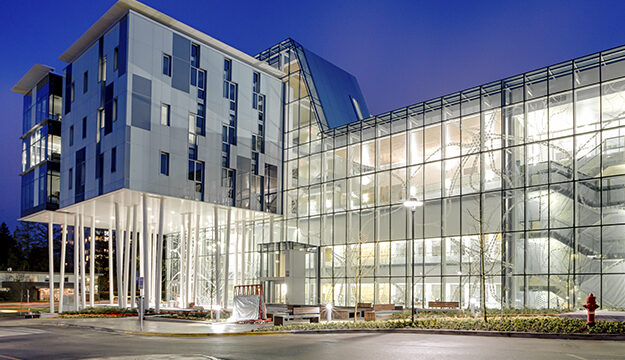Neuroscience is the multidisciplinary study of the brain and the nervous system. Methodologies from many disciplines including cellular and molecular biology, behavioural sciences, cognitive psychology, physiology and anatomy are used to investigate neural function and behaviour.
Why this program?
- It's a multidisciplinary program offered by three UBC faculties: the faculties of Medicine, Arts, and Science.
- UBC has been a leading neuroscience research centre for over 7 decades, with over 120 neuroscientists.
- Students can focus on either Cellular & Molecular neuroscience or Behavioural & Cognitive neuroscience.
Program information
Send details- Campus: Vancouver
- Faculty: Faculty of Science
- Degree: Bachelor of Science
- Length 4.0 yrs
- Co-op Yes
- Honours No
Neuroscience is the multidisciplinary study of the brain and the nervous system. Methodologies from many disciplines including cellular and molecular biology, behavioural sciences, cognitive psychology, physiology and anatomy are used to investigate neural function and behaviour.
The undergraduate program at UBC is a collaboration between the Departments of Cellular and Physiological Sciences (Faculty of Medicine), Zoology (Faculty of Science) and Psychology (Faculty of Arts). You can choose to focus your study between two large areas of Neuroscience – Cellular & Molecular or Cognitive & Behavioural. Data science skill building is integrated into the curriculum, as is personal and professional development. In your final year, Neuroscience students can complete a year-long capstone project in one of the many neuroscience research labs on campus.
Send detailsLife at UBC's Vancouver campus
Study under leading neuroscientists in a university where neuroscience discoveries have been made over many decades. Do so while engaging with your very talented and driven student cohort, many of whom will be in the same courses as you, and some of whom will be your lifetime friend or colleague.
Find out moreYour future
Undergraduate neuroscience students can take many different pathways after graduation, but most will pursue graduate school in neuroscience, advanced/professional degrees in related fields, medical school, research, and industry. Neuroscientists are employed in educational settings, hospitals and other healthcare settings, industrial and government research and development facilities, and government and regulatory agencies.
Program requirements
English-language requirements
English is the language of instruction at UBC. All prospective students must demonstrate English-language competency prior to admission. There are numerous ways to meet the English Language Admission Standard.
General admission requirements
IB Diploma Programme
- Completed IB Diploma, including at least three Higher Level courses.
IB Certificate Courses
- IB Certificate courses (Standard and Higher Level) may be used in an admissions average if you are graduating from a recognized high school curriculum that can be used as your basis of admission.
- IB Math Applications and Interpretations SL, or IB Math Studies, do not satisfy the math requirement for admission to UBC’s science-based programs, the Faculty of Management, the UBC Sauder School of Business, or the Vancouver School of Economics.
Degree-specific requirements: Science
- IB Math Analysis and Approaches SL or HL, or IB Math Applications and Interpretations HL (IB Math Applications and Interpretations SL, or IB Math Studies, are not acceptable)
- One of IB Biology, IB Chemistry, or IB Physics
- Grade 11 or equivalent Chemistry, and
- Grade 11 or equivalent Physics (may be waived with grades of 5 in IB Chemistry and in your IB Mathematics course)
Note: Grade 11 Chemistry and Physics requirements listed are only relevant to students who are not completing the equivalent IB Diploma Chemistry and/or Physics courses.
For students studying outside of Canada, some examples of courses that may be accepted as Grade 11 equivalents are junior-level courses for American students, and IGCSE and O Level for those following British-patterned curricula.
Related courses
The following subject categories are particularly relevant for this degree. Consider taking courses in these areas in your junior year and senior year.
- Language Arts
- Mathematics and Computation
- Sciences
